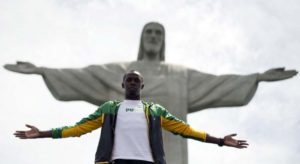The origin of the Olympic Games goes back to the 8th century before Christ. It was a Greek festival of sport and religion to which pilgrims came to watch athletes compete, but also to venerate Zeus, who, they supposed, reigned from atop nearby [see comment below from BTG] Mount Olympus, and who had sent a thunderbolt crashing into a spot between the Alpheus and Kladeos Rivers. In the 5th century BC, a temple was constructed there, in which stood a four-stories-tall statue of the king of the gods built by the sculptor Phidias. Many Greeks felt an obligation to visit the site at least once in a lifetime, a journey not unlike the Muslim hajj.
The Stoic philosopher Epictetus, who lived in the second generation after Christ, wrote of the Olympics:
And what do you do at Olympia? Don’t you melt in the heat? Don’t you get jostled in the crowds? Don’t you encounter a thousand problems when you want to wash? Don’t you get soaked when it rains? Don’t you suffer from the noise, the shouting and the other hassles? But it seems to me you put up with all this because what you’re going to see is worth it.
He could have been writing about Rio 2016.
My own opinion about the Olympics – and about sports overall – is that the competition is worth watching. It’s worth putting up with NBC’s maudlin profiles of athletes and the self-righteousness of Bob Costas (speaking of Greeks) in order to see swimmer Michael Phelps and sprinter Usain Bolt and even the badminton player Lin Dan do what they do better than anybody on earth can do, or perhaps has ever done. Something of the divine shines through when we see human excellence.
I’ll be disappointed if we don’t see world-record-holder Yelena Isinbaeva in the pole vault, because of Russia’s doping scandals. The International Olympic Committee – an organization whose integrity is akin to the UN’s and FIFA’s, and is staffed by the same sort of people – has decided the Russians can compete, despite the fact that WADA, the World Anti-Doping Agency, insisted they be banned. The Russians will be subjected to more drug-testing than other athletes.
I’m assuming there will be some people, athletes and spectators, who will take selfies in front of the statue of Christ the Redeemer on Mount Corcovado, more monumental and majestic than Zeus at Olympia, representing, after all, God not a god. (Rio’s Cardinal Orani Tempesta blessed the Olympic torch there.) And we’ll see plenty of competitors making the sign of the Cross. Usain Bolt, who is Catholic, does so before each race. Bolt’s middle name is St. Leo (for the Great Leo, pope from 440 to 461). If he’d asked me, however, I’d have recommended against the Instagram of him at Christ the Redeemer. (See below.)
It remains to be seen whether Bolt or other Catholic athletes will avail themselves of the five multilingual Brazilian priests assigned to the Olympic Village, where most of the athletes will live for the next two weeks. (Team USA Basketball has rented a luxury cruise ship.) More likely many athletes will avail themselves of the free condoms (made from Amazon rainforest latex): more than 450,000, dispensed gratis from vending machines throughout the Village.
The Village’s Brazilian priests, many trained in outreach during Rio’s World Youth Day in 2013, may find that these young athletes are cut from different cloth than those earlier international pilgrims.

Fr. Marcus Vinicius, the Rio archdiocese’s “pastor of sports ministries,” gave a fairly anodyne comment to the National Catholic Register:
Sports for us, as Christians, is a way to help us grow in our faith and come to understand one another. Christians also understand that body and soul should be well balanced, and sports help address both of those elements.
Maybe so, although emphasis here is on “should be well-balanced.” The reality however – as the Russian doping scandal indicates – is that many of these athletes would do just about anything to win an Olympic medal.
And afterwards, win or lose, they’ll blow off steam, and, one way and another, worship at these Games will more resemble the ancient Greek model, than the WYD version, although it’ll be Aphrodite, not Zeus, to whom the young folks will be offering themselves.
The condom count is staggering – up from 8,500 in Seoul in 1988 and 100,000 in Beijing in 2008. Four years ago in London, the number was 150,000. Why 300,000 more in Rio? Zika fears, maybe?
The presence of Zika in Brazil – the epicenter of the virus – has already meant that the organizing committee had to air-condition all the Village apartments, rather than employ fans and open windows to cool the rooms, as they had originally wished to in order to save money.
Sex has long been a non-medal sport at the Olympics, but the Spartan accommodations in the Village (no in-room TVs, uncertain Wi-Fi), may contribute to an uptick in “safe sex.” How much sex goes on at an Olympics? Hope Solo, Team USA’s perennial soccer goalie, told ESPN prior to the London Games: “I’d say it’s 70 percent to 75 percent of Olympians.” So if my math is right. . .that works out to more than thirty-five condoms per athlete, which – assuming men and women come to their encounters equally prepared – could mean Rio’s organizers have stockpiled sufficient condoms to allow each sexually active athlete to be able to. . .couple seventy times during the fortnight. Five times a day? For days? I don’t think so.
I’m sure it’s too much to hope that at the end of the Games the vast majority of the condoms will remain inside those vending machines, and that such romances as will spark in Rio will lead to chaste engagements and nuptial Masses and wedding nights of joyous first discovery.
But those Catholic priests in the Olympic Village will have their work cut out for them at Bacchanaliad ’16.














